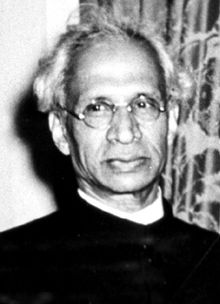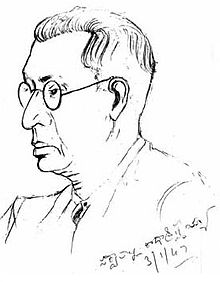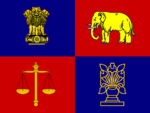- Sarvepalli Radhakrishnan
-
Sir Sarvepalli Radhakrishnan
BR Kt OM FBA
President of India In office
13 May 1962 – 13 May 1967Prime Minister Jawaharlal Nehru
Gulzarilal Nanda (Acting)
Lal Bahadur Shastri
Gulzarilal Nanda (Acting)
Indira GandhiVice President Zakir Hussain Preceded by Rajendra Prasad Succeeded by Zakir Hussain Vice President of India In office
13 May 1952 – 12 May 1962President Rajendra Prasad Preceded by Position established Succeeded by Zakir Hussain Personal details Born 5 September 1888
Thiruttani, British Raj (now India)Died 17 April 1975 (aged 86)
Chennai, IndiaPolitical party Independent Spouse(s) Sivakamu Radhakrishnan Children Five daughters
One sonAlma mater Voorhees College
Madras Christian CollegeProfession Philosopher
ProfessorReligion Hinduism Sir Sarvepalli Radhakrishnan
 pronunciation (help·info), OM, FBA (Telugu: సర్వేపల్లి రాధాకృష్ణ; 5 September 1888, Tiruttani, Tamil Nadu – 17 April 1975) was an Indian philosopher and statesman. He was the first Vice President of India (1952–1962) and subsequently the second President of India (1962–1967).
pronunciation (help·info), OM, FBA (Telugu: సర్వేపల్లి రాధాకృష్ణ; 5 September 1888, Tiruttani, Tamil Nadu – 17 April 1975) was an Indian philosopher and statesman. He was the first Vice President of India (1952–1962) and subsequently the second President of India (1962–1967).One of India's most influential scholars of comparative religion and philosophy, Radhakrishnan is thought of as having built a bridge between the East and the West by showing that the philosophical systems of each tradition are comprehensible within the terms of the other. He wrote authoritative exegeses of India's religious and philosophical literature for the English speaking world. His academic appointments included the King George V Chair of Mental and Moral Science at the University of Calcutta (1921–1931) and Spalding Professor of Eastern Religion and Ethics at Oxford University (1936–1952).
Among the many honours he received were a knighthood (1931), the Bharat Ratna (1954) and the Order of Merit in 1963. His birthday is celebrated in India as Teachers' Day on 5 September.
Contents
Early life and education
Sarvepalli Radhakrishnan was born in a poor Telugu Brahmin family at Tiruttani, a town in then Madras Presidency, British India, now in Thiruvallur District, Tamil Nadu, 84 km to the northwest of Madras (now Chennai). His mother tongue was Telugu.[1] His father's name was Sarvepalli Veeraswami[1] and his mother's name was Sitamma.[1] His early years were spent in Tirutani and Tirupati. His father was a subordinate revenue official in the service of a local zamindar (landlord). His primary education was at Primary Board High School at Tirutani. In 1896 he moved to the Hermansburg Evangelical Lutheral Mission School in Tirupati.[2]
Radhakrishnan was awarded scholarships throughout his academic life. He joined Voorhees College in Vellore but switched to the Madras Christian College at the age of 17. He graduated from there in 1906 with a Master's degree in Philosophy, being one of its most distinguished alumni.[3] Radhakrishnan wrote his thesis for the M.A. degree on "The Ethics of the Vedanta and its Metaphysical Presuppositions".[4] He was afraid that this M.A. thesis would offend his philosophy professor, Dr. A.G. Hogg. Instead, Hogg commended Radhakrishnan on doing an excellent job.[citation needed] Radhakrishnan's M.A. thesis was published when he was only 20.
Radhakrishnan studied philosophy by chance rather than by choice. Being a financially constrained student at the time, when a cousin, after graduating from the same college, passed on his textbooks in philosophy to Radhakrishnan, it automatically decided his academic course.[5][6] Later on he felt deep interest in his subject and wrote many acclaimed works on philosophy, both Eastern and Western.
Marriage
Radhakrishnan was married to Sivakamu,[7] a distant cousin, at the age of 16.[8] As per tradition the marriage was arranged by the family. The couple had five daughters and a son, Sarvepalli Gopal. Sarvepalli Gopal went on to a notable career as a historian. Sivakami died in 1956. They were married for over 51 years.[9]
Career
 Sarvepalli Radhakrishnan drawn by Bujjai and signed by Radhakrishnan in Telugu as "Radhakrishnaiah".
Sarvepalli Radhakrishnan drawn by Bujjai and signed by Radhakrishnan in Telugu as "Radhakrishnaiah".
In April 1909,Sarvepalli Radhakrishnan was appointed to the Department of Philosophy at the Madras Presidency College. Thereafter, in 1918, Radhakrishnan was selected as Professor of Philosophy by the University of Mysore. By that time he had written many articles for journals of repute like The Quest, Journal of Philosophy and the International Journal of Ethics. He also completed his first book, The Philosophy of Rabindranath Tagore. He believed Tagore's philosophy to be the "genuine manifestation of the Indian spirit". Radhakrishnan's second book, The Reign of Religion in Contemporary Philosophy was published in 1920.
In 1921 he was appointed as a professor in philosophy to occupy the King George V Chair of Mental and Moral Science at the University of Calcutta. Radhakrishnan represented the University of Calcutta at the Congress of the Universities of the British Empire in June 1926 and the International Congress of Philosophy at Harvard University in September 1926. Another important academic event during this period was the invitation to deliver the Hibbert Lecture on the ideals of life which he delivered at Harris Manchester College, Oxford in 1929 and which was subsequently published in book form as An Idealist View of Life.
In 1929 Radhakrishnan was invited to take the post vacated by Principal J. Estlin Carpenter at Harris Manchester College. This gave him the opportunity to lecture to the students of the University of Oxford on Comparative Religion. For his services to education he was knighted by George V in the June 1931 Birthday Honours,[10] and formally invested with his honour by the Governor-General of India, the Earl of Willingdon, in April 1932.[11] However, he did not use the title in personal life, preferring instead his academic title of 'Doctor'.
He was the Vice-Chancellor of Andhra University from 1931 to 1936. In 1936 Radhakrishnan was named Spalding Professor of Eastern Religions and Ethics at the University of Oxford, and was elected a Fellow of All Souls College. In 1939 Pt. Madan Mohan Malaviya invited him to succeed him as the Vice-Chancellor of Banaras Hindu University (BHU).[12] He served as its Vice-Chancellor till January 1948.
When India became independent in 1947, Radhakrishnan represented India at UNESCO (1946–52) and was later Ambassador of India to the Soviet Union, from 1949 to 1952. He was also elected to the Constituent Assembly of India.
Radhakrishnan was elected as the first Vice President of India in 1952.[9] He was elected as the second President of India (1962–1967). When he became President, some of his students and friends requested him to allow them to celebrate his birthday, 5 September. He replied,
"Instead of celebrating my birthday, it would be my proud privilege if 5 September is observed as Teachers' Day."
His birthday has since been celebrated as Teachers' Day in India.[13]
Along with Ghanshyam Das Birla and some other social workers in the pre-independence era, Radhakrishnan formed the Krishnarpan Charity Trust.
Philosophy
Radhakrishnan stated that Western philosophers, despite all claims to objectivity, were influenced by theological influences of their own culture.[14] He wrote books on Indian philosophy according to Western academic standards, and made all efforts for the West to give serious consideration to Indian philosophy. In his book An Idealist View of Life, he made a powerful case for the importance of intuitive thinking as opposed to purely intellectual forms of thought. He is well known for his commentaries on the Prasthana Trayi namely, the Bhagavadgita, the Upanishads and the Brahma Sutra.
“ It is not God that is worshipped but the authority that claims to speak in His name. Sin becomes disobedience to authority not violation of integrity. ” "Reading a book gives us the habit of solitary reflection and true enjoyment" "When we think we learn we cease to know" "A literary genius, it is said, resembles all, though no one resembles him."
Awards
Radhakrishnan was appointed a Knight Bachelor in 1931.[10] He was elected Fellow of the British Academy in 1938. He was awarded the Bharat Ratna in 1954[15] and the Order of Merit in 1963. He received the Peace Prize of the German Book Trade in 1961 and the Templeton Prize in 1975, a few months before his death. He donated the entire amount of the Templeton Prize to Oxford University. In 1989, the university instituted the Radhakrishnan Scholarships in his memory. The scholarships were later renamed the "Radhakrishnan Chevening Scholarships".[citation needed]
Radhakrishnan was nominated for the Nobel Prize for Literature for five consecutive years from 1933–1937, although he did not win. His nominator was Hjalmar Hammarskjöld, father of Dag Hammarskjöld.[16]
Works by Sarvepalli Radhakrishnan
- Indian Philosophy (1923) Vol.1,738 pages. Vol 2, 807 pages. Oxford University Press.
- The Hindu View of Life (1926), 92 pages
- An Idealist View of Life (1929), 351 pages
-
- Review: E.A. Burtt (Cornell University), The Philosophical Review, Vol. 44, No. 2, (Mar., 1935), pp. 205–207
-
"Those who have read the author's previous volumes or have heard him speak are accustomed to associate with him warmth and vigor of style, penetrating flashes of keen analysis, and detailed familiarity with past and present philosophies in both east and west. In these respects none will find the book disappointing."
- Eastern Religions and Western Thought (1939), Oxford University Press, 396 pages
- Religion and Society (1947), George Allen and Unwin Ltd., London, 242 pages
- The Bhagavadgītā: with an introductory essay, Sanskrit text, English translation and notes (1948), 388 pages
- The Dhammapada (1950), 194 pages, Oxford University Press
- The Principal Upanishads (1953), 958 pages, HarperCollins Publishers Limited
- Recovery of Faith (1956), 205 pages
- A Source Book in Indian Philosophy (1957), 683 pages, Princeton University Press
-
- Review: E.A. Burtt (Cornell University), The Philosophical Review, Vol. 67, No. 3, (July 1958), pp. 411–412
-
"I believe this is the first time I have written a review when no negative criticism of any kind seemed to me warranted. ... No one interested in Indian thought who does not expect to master the original materials can dispense with this book."
- Religion, Science & Culture (1968), 121 pages
Works on Radhakrishnan
Several books have been published on Sarvepalli Radhakrishnan:
- Schilpp, Paul Arthur (1992) [1952, Tudor]. The Philosophy of Sarvepalli Radhakrishnan. Motilal Banarsidass. ISBN 8120807928. http://books.google.com/books?id=cDdpTcyJtxMC&printsec=frontcover&dq=8120807928&cd=1#v=onepage&q=&f=false.
- Murty, K. Satchidananda; Ashok Vohra (1990). Radhakrishnan: his life and ideas. SUNY Press. ISBN 0791403432. http://books.google.com/books?id=x6FsaptULgAC&pg=PP1&dq=radhakrishnan&cd=1#v=onepage&q=&f=false.
- Minor, Robert Neil (1987). Radhakrishnan: a religious biography. SUNY Press. ISBN 0887065546. http://books.google.com/books?id=2LzRkWABC6sC&printsec=frontcover&dq=radhakrishnan&cd=5#v=onepage&q=&f=false.
- Gopal, Sarvepalli (1989). Radhakrishnan: a biography. Unwin Hyman. ISBN 0044404492. http://books.google.com/books?id=ryluAAAAMAAJ&q=radhakrishnan&dq=radhakrishnan&cd=7.
References
- ^ a b c "TeluguOne". TeluguOne. http://www.teluguone.com/splevents/general/index.jsp?filename=srkrishna05.htm. Retrieved 2011-08-31.
- ^ Sarvepalli Gopal: Radhakrishnan; a Biography (1989) p. 11
- ^ Sarvepalli Gopal: Radhakrishnan; a Biography (1989) p.15
- ^ Sarvepalli Gopal: Radhakrishnan; a Biography (1989) p.17
- ^ The Philosophy of Sarvepalli Radhakrishnan (1952) p.6
- ^ Sarvepalli Gopal: Radhakrishnan; a Biography (1989) p.14
- ^ Radhakrishnan's wife's name is spelled differently in different sources. It is spelled Sivakamu by Sarvepalli Gopal (1989); Sivakamuamma by Mamta Anand (2006); and still differently by others.
- ^ Sarvepalli Gopal: Radhakrishnan; a Biography (1989) p. 12
- ^ a b TeluguOne
- ^ a b "Viewing Page 3624 of Issue 33722". London-gazette.co.uk. 1931-06-02. http://www.london-gazette.co.uk/issues/33722/supplements/3624. Retrieved 2011-08-31.
- ^ "Viewing Page 2398 of Issue 33816". London-gazette.co.uk. 1932-04-12. http://www.london-gazette.co.uk/issues/33816/pages/2398. Retrieved 2011-08-31.
- ^ Murty, K. Satchidananda; Ashok Vohra (1990). Radhakrishnan: his life and ideas. SUNY Press. p. 90. ISBN 0791403432. http://books.google.co.in/books?id=x6FsaptULgAC&pg=PA90&dq=Madan+Mohan+Malaviya&cd=20#v=onepage&q=Madan%20Mohan%20Malaviya&f=false.
- ^ "Teachers' Day". Festivalsofindia.in. http://www.festivalsofindia.in/id/td. Retrieved 2011-08-31.
- ^ Sarvepalli Radhakrishnan, Charles Moore (eds.), A Source Book in Indian Philosophy, Princeton: Princeton University Press 1989, 610–639
- ^ "Padma Awards Directory (1954–2007)". Ministry of Home Affairs. http://www.mha.nic.in/pdfs/PadmaAwards1954-2007.pdf. Retrieved 26 November 2010.
- ^ "Nobel Database". Nobelprize.org. http://nobelprize.org/nobel_prizes/literature/nomination/nomination.php?key1=candcountry&log1=LIKE&string1=IN&action=advsearch&log10=OR&key2=candname&log2=LIKE&string2=&log11=OR&key3=candname&log3=LIKE&string3=&startyear=&endyear=&order1=year&order2=nomname&order3=cand1name&submit2.x=7&submit2.y=8. Retrieved 2011-08-31.
- Robert N. Minor: Radhakrishnan – a Religious Biography, State University of New York Press, Albany, NY, 1987, 189 pp. ISBN 9780887065552
- New Essays in the Philosophy of Sarvepalli Radhakrishnan. Ed. by S.S. Rama Rao Pappu, Sri Satguru Publications, Delhi. ISBN 9788170304616
External links
- Official Website – Sarvepalli RadhaKrishnan
- "Dr. Sarvepalli Radhakrishnan- The philosopher president", Press Information Bureau, Government of India
- "Sarvepalli Radhakrishnan (1888—1975)" by Michael Hawley, Internet Encyclopedia of Philosophy
Political offices New office Vice President of India
1952–1962Succeeded by
Zakir HussainPreceded by
Rajendra PrasadPresident of India
1962–1967 Presidents of India
Presidents of IndiaRajendra Prasad · Sarvepalli Radhakrishnan · Zakir Hussain · V.V. Giri† · Muhammad Hidayatullah† · V.V. Giri · Fakhruddin Ali Ahmed · Basappa Danappa Jatti† · Neelam Sanjiva Reddy · Zail Singh · R. Venkataraman · Shankar Dayal Sharma · K.R. Narayanan · Abdul Kalam · Pratibha Patil
 "†" indicate acting or caretaker officeholders.
"†" indicate acting or caretaker officeholders. Vice Presidents of India
Vice Presidents of IndiaSarvepalli Radhakrishnan · Zakir Hussain · V. V. Giri · Gopal Swarup Pathak · Basappa Danappa Jatti · Muhammad Hidayatullah · R. Venkataraman · Shankar Dayal Sharma · K. R. Narayanan · Krishan Kant · Bhairon Singh Shekhawat · Mohammad Hamid Ansari

Templeton Prize laureates Mother Teresa (1973) • Frère Roger (1974) • Sarvepalli Radhakrishnan (1975) • Leo Joseph Suenens (1976) • Chiara Lubich (1977) • Thomas Torrance (1978) • Nikkyo Niwano (1979) • Ralph Wendell Burhoe (1980) • Cicely Saunders (1981) • Billy Graham (1982) • Aleksandr Solzhenitsyn (1983) • Michael Bourdeaux (1984) • Alister Hardy (1985) • James I. McCord (1986) • Stanley Jaki (1987) • Inamullah Khan (1988) • Carl Friedrich von Weizsäcker & George MacLeod (1989) • Baba Amte & Charles Birch (1990) • Immanuel Jakobovits (1991) • Kyung-Chik Han (1992) • Charles Colson (1993) • Michael Novak (1994) • Paul Davies (1995) • Bill Bright (1996) • Pandurang Shastri Athavale (1997) • Sigmund Sternberg (1998) • Ian Barbour (1999) • Freeman Dyson (2000) • Arthur Peacocke (2001) • John Polkinghorne (2002) • Holmes Rolston III (2003) • George Ellis (2004) • Charles Hard Townes (2005) • John D. Barrow (2006) • Charles Taylor (2007) • Michał Heller (2008) • Bernard d'Espagnat (2009) • Francisco J. Ayala (2010) • Martin John Rees (2011)
Categories:- 1888 births
- 1975 deaths
- 20th-century philosophers
- Advaitin philosophers
- Madras Christian College alumni
- Ambassadors of India to the Soviet Union
- Contemporary Indian philosophers
- Fellows of All Souls College, Oxford
- Fellows of the British Academy
- Hindu philosophers
- Honorary Members of the Order of Merit
- Indian educationists
- Indian Hindus
- Knights Bachelor
- Members of Constituent Assembly of India
- Modern Hindu writers
- Presidents of India
- Recipients of the Bharat Ratna
- Recipients of the Peace Prize of the German Book Trade
- Recipients of the Pour le Mérite (civil class)
- Telugu people
- Templeton Prize laureates
- Vice-Presidents of India
- University of Calcutta alumni
- University of Calcutta faculty
- University of Mysore faculty
- University of Madras faculty
Wikimedia Foundation. 2010.


